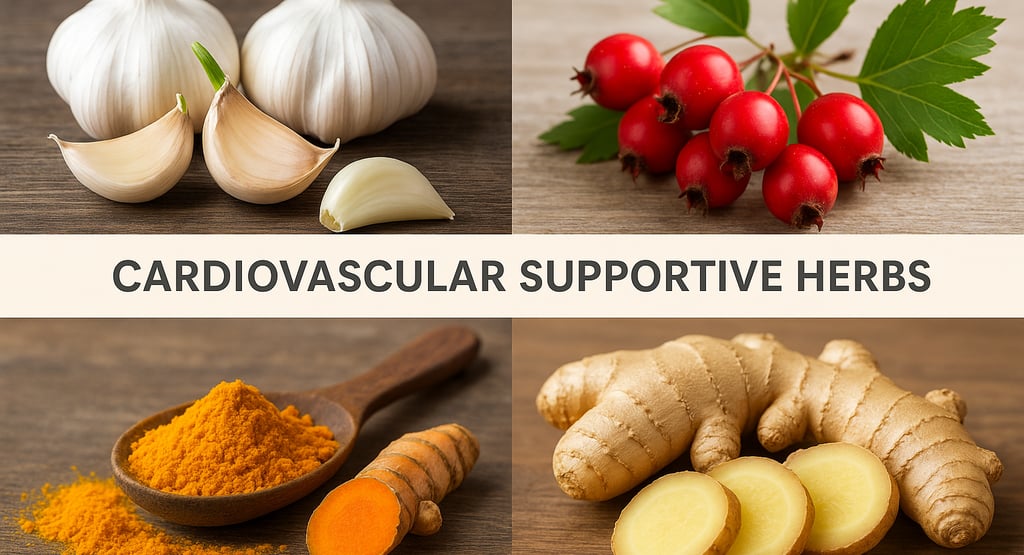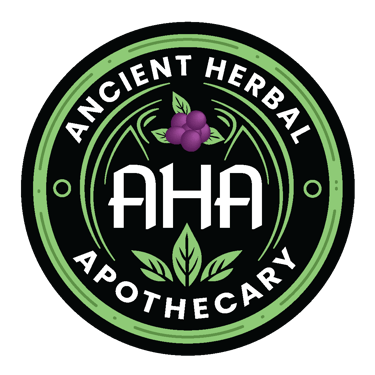Cholesterol & Circulation: How Herbs Can Support a Healthy Heart
Luann Morris
11/17/20255 min read


Understanding Cholesterol and Its Role in Heart Health
Cholesterol is a waxy, fat-like substance found in every cell of the body, where it plays essential roles in various physiological functions. It is vital for producing hormones, vitamin D, and substances that help digest foods. Cholesterol circulates in the bloodstream bound to proteins, forming what is known as lipoproteins. The two primary types of cholesterol are low-density lipoprotein (LDL) and high-density lipoprotein (HDL). LDL cholesterol is often referred to as "bad" cholesterol because high levels can lead to the buildup of fatty deposits in arteries, increasing the risk of heart disease. Conversely, HDL cholesterol is labeled "good" cholesterol, as it aids in transporting cholesterol away from the arteries and back to the liver for disposal, thereby helping to reduce overall cholesterol levels in the bloodstream.
Maintaining a proper balance between LDL and HDL cholesterol is crucial for heart health. An imbalance, specifically high LDL levels or low HDL levels, can contribute to the development of atherosclerosis—a condition where arteries narrow due to plaque buildup. This can ultimately lead to serious cardiovascular events, including heart attacks and strokes. Various factors influence cholesterol levels, including diet, physical activity, genetics, and even age. Consuming a diet high in saturated and trans fats can elevate LDL cholesterol whereas foods rich in fiber, such as fruits, vegetables, and whole grains, can help improve HDL levels.
Furthermore, lifestyle choices such as regular exercise, smoking cessation, and maintaining a healthy weight play a vital role in managing cholesterol levels. Understanding these factors is fundamental for individuals seeking to enhance their overall heart health. By adopting heart-healthy practices, one can mitigate the risk of cholesterol imbalance and its negative impact on cardiovascular wellness. Establishing a proactive approach in this regard is essential for achieving and sustaining a healthy heart throughout life.
The Impact of Circulation on Heart Function
Circulation plays a critical role in maintaining heart function and overall body health. The heart relies on a well-functioning circulatory system to deliver oxygen-rich blood and essential nutrients to its tissues and other organs. When circulation is optimal, the body can efficiently support its functions, enhance energy levels, and minimize feelings of fatigue. Conversely, issues in circulation can lead to significant cardiovascular complications, impacting heart health.
One of the most common circulatory problems is atherosclerosis, characterized by the buildup of fatty deposits (plaques) in the arteries. This condition narrows the arteries, restricting blood flow and increasing the risk of heart attacks and strokes. Atherosclerosis not only affects the heart but can also impair circulation to vital organs, leading to serious health concerns. Hypertension, or high blood pressure, is another critical condition characterized by excessive force of blood against the artery walls. This situation can lead to thicker artery walls, which can compromise circulation and contribute to heart disease.
Improving circulation is essential for heart health. Enhanced blood flow ensures that the heart receives sufficient oxygen and nutrients, which are vital for its performance and longevity. Furthermore, proper circulation supports the removal of metabolic waste products, including carbon dioxide, from the body. Engaging in regular physical activity, maintaining a healthy diet, and incorporating herbs known for their beneficial effects on circulation can collectively foster heart health and improve overall well-being.
By recognizing and addressing potential circulatory issues, individuals can take proactive steps towards safeguarding their heart function. By prioritizing circulatory health, one not only contributes to a robust cardiovascular system but also promotes energy and vitality necessary for daily activities.
Herbs That Support Heart Health and Circulation
Various herbs have been recognized for their potential benefits in promoting heart health and enhancing circulation. Among these, garlic stands out prominently. Traditionally used for its medicinal properties, garlic has been associated with lowering cholesterol levels and reducing blood pressure. Scientific studies suggest that the active compound allicin in garlic can improve lipid profiles and support overall cardiovascular health. Consuming raw garlic in salads or as a supplement can be an effective way to incorporate this herb into one’s diet.
Another noteworthy herb is ginger, revered for its anti-inflammatory and antioxidant properties. Ginger has demonstrated efficacy in improving circulation and may contribute to lowered cholesterol levels, as supported by several studies. Incorporating ginger into daily routines can be easily achieved by adding it to teas or smoothies, or using it as a spice in various dishes to enhance flavor while reaping its health benefits.
Hawthorn is another herb traditionally employed for heart health. It is known to strengthen blood vessels and improve blood circulation. Research involving hawthorn extract reveals its positive effects on heart function and its potential to alleviate symptoms of heart-related conditions. Hawthorn can be consumed in various forms, including teas, capsules, or liquid extracts, making it accessible for individuals looking to enhance their heart health.
Finally, turmeric, renowned for its active compound curcumin, is celebrated for its anti-inflammatory properties. Recent studies indicate that curcumin may help in reducing cholesterol levels and promoting a healthy cardiovascular system. Turmeric can be effortlessly incorporated into diets through cooking, teas, or supplements, providing both flavor and heart health benefits.
Incorporating these herbs into one’s daily diet may not only be beneficial for heart health but can also serve as a flavorful addition to meals and beverages.
Lifestyle Changes for a Healthy Heart: Integrating Herbs into Daily Life
Maintaining a healthy heart requires a holistic approach that encompasses various lifestyle changes. One crucial aspect is the incorporation of herbs into a daily routine, which can complement other heart-healthy practices. A balanced diet is foundational; it is beneficial to include leafy greens, whole grains, legumes, and fruits, while making herbs an integral part of meals. For example, incorporating garlic, known for its potential to lower cholesterol levels, into cooking can enhance both flavor and heart health. Similarly, turmeric, with its anti-inflammatory properties, can be easily added to soups, stews, and smoothies.
In addition to dietary adjustments, regular physical activity is vital for cardiovascular health. Aim for at least 150 minutes of moderate aerobic exercise each week. Activities such as walking, cycling, or swimming can significantly improve circulation and strengthen the heart. Integrating herbal remedies like ginger tea post-exercise can aid in recovery and inflammation reduction, offering a dual benefit for those who lead an active lifestyle. Furthermore, maintaining consistent physical movement helps manage stress, which is another vital component of heart health.
Mindfulness practices like yoga or meditation can foster relaxation and assist in stress management. These practices not only enhance mental well-being but can also lower blood pressure and heart rate, thus contributing to cardiovascular health. When combined with herbs such as chamomile or peppermint, which are known for their calming effects, individuals can establish a powerful routine that promotes heart wellness. Establishing a supportive environment by incorporating these elements regularly aids in sustaining a lifestyle conducive to heart health.
By adopting these practical lifestyle changes and seamlessly integrating herbs into daily activities, individuals can support their cardiovascular system. This multifaceted approach not only boosts heart health but also aligns with overall well-being, ensuring a harmonious balance between body and mind.
